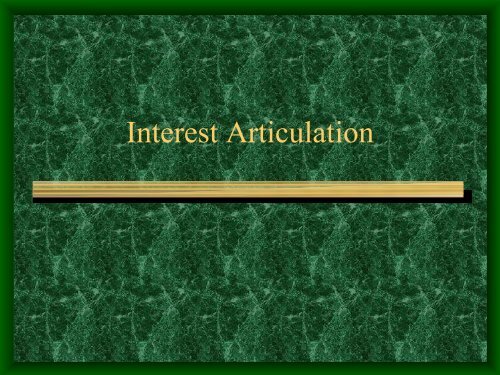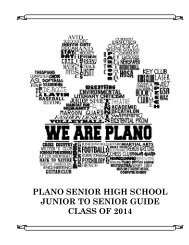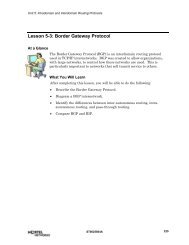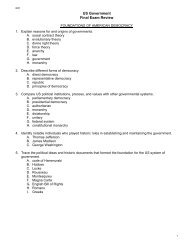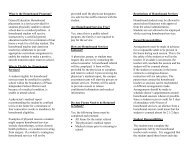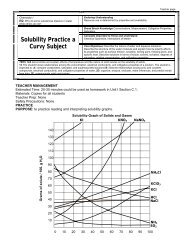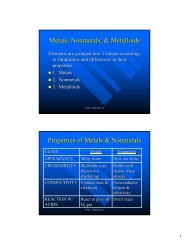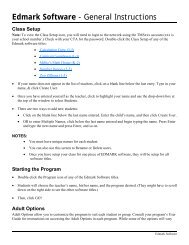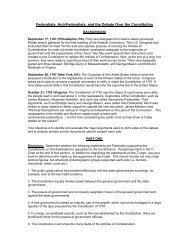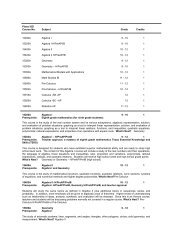Interest Articulation
Interest Articulation
Interest Articulation
You also want an ePaper? Increase the reach of your titles
YUMPU automatically turns print PDFs into web optimized ePapers that Google loves.
<strong>Interest</strong> <strong>Articulation</strong>
What is <strong>Interest</strong> <strong>Articulation</strong>?<br />
• <strong>Interest</strong> <strong>Articulation</strong>: Citizens and social<br />
groups expressing their needs and demands<br />
to the government.<br />
• In larger political systems individuals<br />
working together as a formal interest group<br />
are a prime tool in promoting political<br />
interests.
Citizen Action<br />
• Forms of citizen interest articulation:<br />
• Voting in elections=modest pressure,<br />
unfocused<br />
• Informal group, social movement= Light<br />
pressure<br />
• Direct contact= Low pressure<br />
• Protest Activity=High pressure
Importance of Elections<br />
• Elections perform many functions in<br />
addition to expression of needs:<br />
• Aggregation of political interest<br />
• Recruitment of political elites<br />
• Socialization of political values and<br />
preferences through the campaign process
Voting<br />
• Citizens in Europe and Russia tend to vote<br />
in greater numbers than citizens in the U.S.<br />
• Lack of voter turnout in U.S. does not<br />
necessarily mean voter apathy, as the U.S.<br />
has a much higher percentage of people<br />
who worked for a party/candidate, signed a<br />
petition, or tried to persuade others on how<br />
to vote.
Coercive Access Channels &<br />
Tactics<br />
• Collective Acts of<br />
violence stem from the<br />
character of society.<br />
• Frustration that breeds<br />
anger stems from<br />
deprivation, “a<br />
discrepancy between<br />
people’s expectations<br />
about their … conditions<br />
and the degree to which<br />
they think they can attain<br />
these (Ted Robert Gurr).”
Riots<br />
• Most common outburst of<br />
anger is a riot; not always<br />
a useless spasm of<br />
violence caused by one<br />
event.<br />
• Ex: LA Riots of 1992: was<br />
“sparked” by Rodney<br />
King, but was a release of<br />
years of frustration.<br />
• Brought to light numerous<br />
problems.
• Strikes: mostly used by<br />
labor unions but when<br />
used by other interest<br />
groups, results are mixed.<br />
• Strikes in late 1980’s<br />
brought down communist<br />
govs. in Eastern Europe,<br />
but student strikes in<br />
Korea in 1970’s and<br />
1980’s had little effect.<br />
Strikes
Political Terror Tactics<br />
• Extreme acts of violence<br />
(assassinations, bombings,<br />
etc.) used by groups to<br />
“change the rules of the<br />
political game”.<br />
• Rarely successful because<br />
it never attracts enough<br />
public sympathy.<br />
• Can sometimes destroy a<br />
democratic regime<br />
• Ex: Palestine/Israel,<br />
Northern Ireland & IRA
<strong>Interest</strong> Group Systems<br />
• Connections between interest groups and<br />
government policymakers<br />
• Groups have influence on laws that are<br />
made, both officially and unofficially<br />
• Three types of group systems: Pluralist,<br />
Corporatist, and controlled
Pluralist Group Systems<br />
• Multiple groups represent<br />
a single interest<br />
• Membership isn’t required<br />
and is limited<br />
• Groups are loose and<br />
decentralized<br />
• Clear separation between<br />
groups and the<br />
government<br />
• Ex: US, Japan, France
Corporatist Group Systems<br />
• A single peak association<br />
usually represents each social<br />
interest<br />
• Membership is compulsory and<br />
usually universal<br />
• Peak associations are usually<br />
centrally organized<br />
• Often systematically involved<br />
in making and implementing<br />
policy<br />
• Ex: Sweden, Austria, Norway
Control Group System<br />
• Single group for each<br />
social sector<br />
• Membership often<br />
compulsory<br />
• Hierarchally organized<br />
• Controlled by the<br />
government or its agents<br />
• Groups exist to facilitate<br />
government control
Channels of Political Access<br />
Legitimate:<br />
• Voting<br />
• Bargaining<br />
• Promises of support<br />
• Personal ties (ex: friends,<br />
family)<br />
• Mass media<br />
• Lobbying<br />
• Political parties<br />
• Government<br />
Bureaucracies<br />
Illegitimate<br />
• Violence<br />
• Intimidation
<strong>Interest</strong> Group Development<br />
• Democratic development<br />
requires some form of<br />
interest groups to express<br />
needs of groups.<br />
• Some countries, because<br />
of years of heavy political<br />
control, have a hard time<br />
forming interest groups.<br />
(Ex: Eastern Europe)
<strong>Interest</strong> Group Development<br />
Cont.<br />
• Groups that oppose ideals<br />
don’t always balance out<br />
(ex: NRA trumps small<br />
gun control groups).<br />
• In Third World Countries,<br />
poorer class rarely has<br />
interest groups.<br />
• In advanced<br />
democracies(US, UK,<br />
Japan) fewer people are<br />
involved in the political<br />
system than in years past.
Anomic Groups<br />
• Anomic groups – generally spontaneous groups<br />
that form suddenly when many individuals<br />
respond similarly to frustration, disappointment,<br />
or other strong emotions<br />
• Wildcat Strikes – spontaneous strike actions by<br />
local workers, not organized actions by national<br />
unions<br />
• -examples of anomic groups are: LA riot in 1992,<br />
because the groups dispersed after the protest<br />
ended
Nonassociational Groups<br />
• Rarely well organized because activity is episodic<br />
but different from anomic groups because they are<br />
based on common interests of ethnicity, religion,<br />
or kinship<br />
• More continuity than anomic groups<br />
• Collection action problems – “free riders” are<br />
examples of problems because they share the<br />
success of a collective group effort by do not<br />
participate
Institutional Groups<br />
• Institutional Groups are formal and have other<br />
political or social functions in addition to interest<br />
articulation<br />
• The influence of the groups is usually derived<br />
from the strength of their primary organizational<br />
base --- union members or affiliated businesses<br />
• Nonpolitical institutional groups can also become<br />
involved in the political process
Associational Groups<br />
• Associational groups – formed explicitly to<br />
represent the interests of a particular group<br />
• These organizations have orderly<br />
procedures for formulation interests and<br />
demands, they usually employ a full-time<br />
professional staff
Civil Society<br />
• Civil society – a society in which people are<br />
involved in a social and political interactions free<br />
of state control or regulation<br />
• AS political and economic conditions become<br />
interdependent across nations, there is also<br />
increasing attention directed toward the<br />
development of a global civil society to parallel<br />
these political and economic developments


